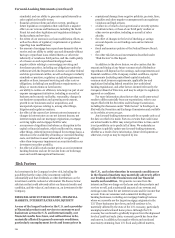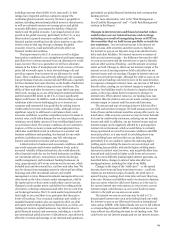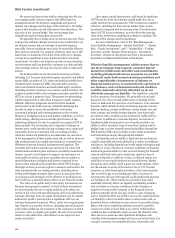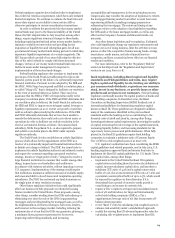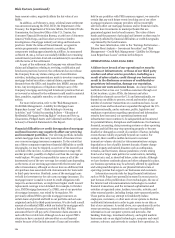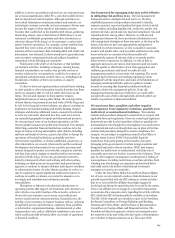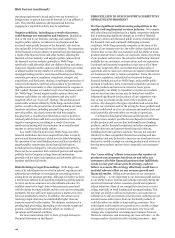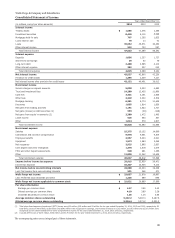Wells Fargo 2014 Annual Report Download - page 125
Download and view the complete annual report
Please find page 125 of the 2014 Wells Fargo annual report below. You can navigate through the pages in the report by either clicking on the pages listed below, or by using the keyword search tool below to find specific information within the annual report.securitization trust, investor or insurer for credit losses incurred
on loans in the event of a breach of contractual representations
or warranties that is not remedied within a period (usually
90 days or less) after we receive notice of the breach. Contracts
for mortgage loan sales to the GSEs include various types of
specific remedies and penalties that could be applied to
inadequate responses to repurchase requests. Similarly, the
agreements under which we sell mortgage loans require us to
deliver various documents to the securitization trust or investor,
and we may be obligated to repurchase any mortgage loan as to
which the required documents are not delivered or are defective.
We may negotiate global settlements in order to resolve a
pipeline of demands in lieu of repurchasing the loans. We
establish a mortgage repurchase liability related to the various
representations and warranties that reflect management’s
estimate of losses for loans which we have a repurchase
obligation. Our mortgage repurchase liability represents
management’s best estimate of the probable loss that we may
expect to incur for the representations and warranties in the
contractual provisions of our sales of mortgage loans. Because
the level of mortgage loan repurchase losses depends upon
economic factors, investor demand strategies and other external
conditions that may change over the life of the underlying loans,
the level of the liability for mortgage loan repurchase losses is
difficult to estimate and requires considerable management
judgment. As a result of the uncertainty in the various estimates
underlying the mortgage repurchase liability, there is a range of
losses in excess of the recorded mortgage repurchase liability
that are reasonably possible. The estimate of the range of
possible loss for representations and warranties does not
represent a probable loss, and is based on currently available
information, significant judgment, and a number of assumptions
that are subject to change. If economic conditions and the
housing market do not continue to improve or future investor
repurchase demand and our success at appealing repurchase
requests differ from past experience, we could continue to have
increased repurchase obligations and increased loss severity on
repurchases, requiring material additions to the repurchase
liability.
Additionally, for residential mortgage loans that we
originate, borrowers may allege that the origination of the loans
did not comply with applicable laws or regulations in one or
more respects and assert such violation as an affirmative defense
to payment or to the exercise by us of our remedies, including
foreclosure proceedings, or in an action seeking statutory and
other damages in connection with such violation. If we are not
successful in demonstrating that the loans in dispute were
originated in accordance with applicable statutes and
regulations, we could become subject to monetary damages and
other civil penalties, including the loss of certain contractual
payments or the inability to exercise certain remedies under the
loans.
For more information, refer to the “Risk Management –
Credit Risk Management – Liability for Mortgage Loan
Repurchase Losses” section in this Report.
We may be terminated as a servicer or master servicer,
be required to repurchase a mortgage loan or
reimburse investors for credit losses on a mortgage
loan, or incur costs, liabilities, fines and other
sanctions if we fail to satisfy our servicing obligations,
including our obligations with respect to mortgage loan
foreclosure actions. We act as servicer and/or master
servicer for mortgage loans included in securitizations and for
unsecuritized mortgage loans owned by investors. As a servicer
or master servicer for those loans we have certain contractual
obligations to the securitization trusts, investors or other third
parties, including, in our capacity as a servicer, foreclosing on
defaulted mortgage loans or, to the extent consistent with the
applicable securitization or other investor agreement,
considering alternatives to foreclosure such as loan
modifications or short sales and, in our capacity as a master
servicer, overseeing the servicing of mortgage loans by the
servicer. If we commit a material breach of our obligations as
servicer or master servicer, we may be subject to termination if
the breach is not cured within a specified period of time
following notice, which can generally be given by the
securitization trustee or a specified percentage of security
holders, causing us to lose servicing income. In addition, we may
be required to indemnify the securitization trustee against losses
from any failure by us, as a servicer or master servicer, to
perform our servicing obligations or any act or omission on our
part that involves willful misfeasance, bad faith or gross
negligence. For certain investors and/or certain transactions, we
may be contractually obligated to repurchase a mortgage loan or
reimburse the investor for credit losses incurred on the loan as a
remedy for servicing errors with respect to the loan. If we have
increased repurchase obligations because of claims that we did
not satisfy our obligations as a servicer or master servicer, or
increased loss severity on such repurchases, we may have a
significant reduction to net servicing income within mortgage
banking noninterest income.
We may incur costs if we are required to, or if we elect to, re-
execute or re-file documents or take other action in our capacity
as a servicer in connection with pending or completed
foreclosures. We may incur litigation costs if the validity of a
foreclosure action is challenged by a borrower. If a court were to
overturn a foreclosure because of errors or deficiencies in the
foreclosure process, we may have liability to the borrower and/
or to any title insurer of the property sold in foreclosure if the
required process was not followed. These costs and liabilities
may not be legally or otherwise reimbursable to us, particularly
to the extent they relate to securitized mortgage loans. In
addition, if certain documents required for a foreclosure action
are missing or defective, we could be obligated to cure the defect
or repurchase the loan. We may incur liability to securitization
investors relating to delays or deficiencies in our processing of
mortgage assignments or other documents necessary to comply
with state law governing foreclosures. The fair value of our MSRs
may be negatively affected to the extent our servicing costs
increase because of higher foreclosure costs. We may be subject
to fines and other sanctions imposed by Federal or state
regulators as a result of actual or perceived deficiencies in our
foreclosure practices or in the foreclosure practices of other
mortgage loan servicers. Any of these actions may harm our
reputation or negatively affect our residential mortgage
origination or servicing business. In particular, on February 28,
2013, we entered into amendments to an April 2011 Consent
Order with both the OCC and the FRB, which effectively ceased
the Independent Foreclosure Review program created by such
Consent Order and replaced it with an accelerated remediation
commitment to provide foreclosure prevention actions on
$1.2 billion of residential mortgage loans, subject to a process to
be administered by the OCC and the FRB. During 2014, we
believe we reported sufficient foreclosure prevention actions to
the monitor of the accelerated remediation process to meet the
$1.2 billion commitment, but are awaiting monitor approval. As
noted above, any increase in our servicing costs from changes in
our foreclosure and other servicing practices, including resulting
123



